The key to a website’s success is the number of visitors it attracts. That is why SEO for Developers is significant to understand the importance of SEO during the website development phase itself.
“Search engine optimization is most effective when integrated into the development process, not treated as an afterthought.”
This is the reason businesses who want to stay competitive hire the best SEO services provider who can work with developers and build not only aesthetically pleasing and well-functioning websites but also ensure their high ranking in search engines and drive more visitors, which can ultimately help in improving sales, expanding target audience and boost revenue generation.
When developers follow a systematic approach towards development, keeping SEO in mind, the website will likely gain higher rankings, leading to growth in customer base and revenue generation.
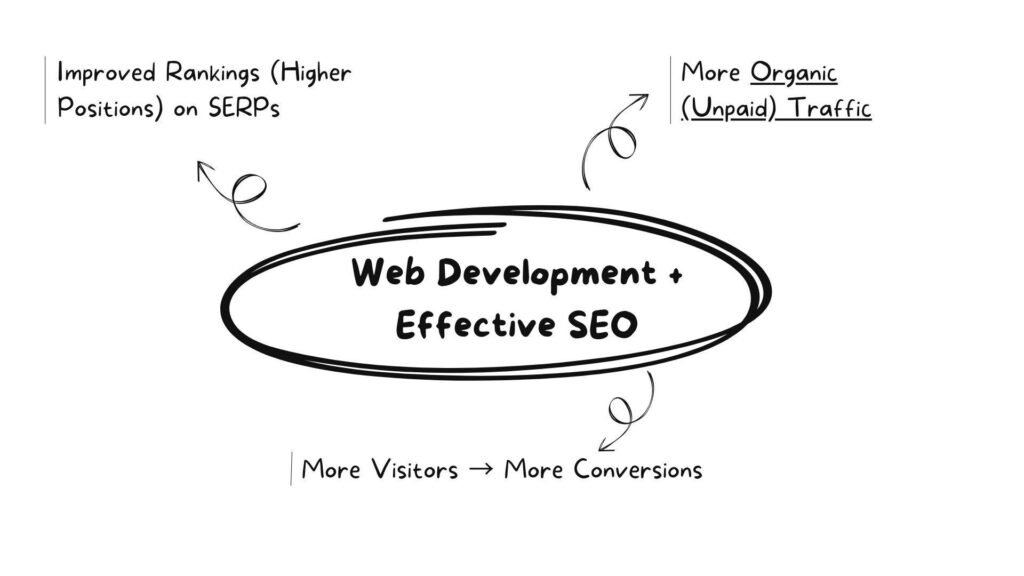
Now, when we have already understood why SEO for Developers is important to be integrated in the web development phase itself, let’s have a look at 10 best SEO practices for developers to be considered while building a website.
10 Best Practices in SEO for Developers
Below are the 10 best SEO for Developers practices that can help developers build websites that rank higher in search engines and drive traffic and conversions.
1 User-Friendly Website Structure
A website structure should be designed in such a way that it becomes simple to understand and navigate for users and search engine algorithms both. It should represent your website’s hierarchy and unambiguously indicate the connection between different web pages.
For example, a URL like “mywebsite.com/women/dresses/party-wear” indicates that “party wear” is part of the “dresses for women” category.
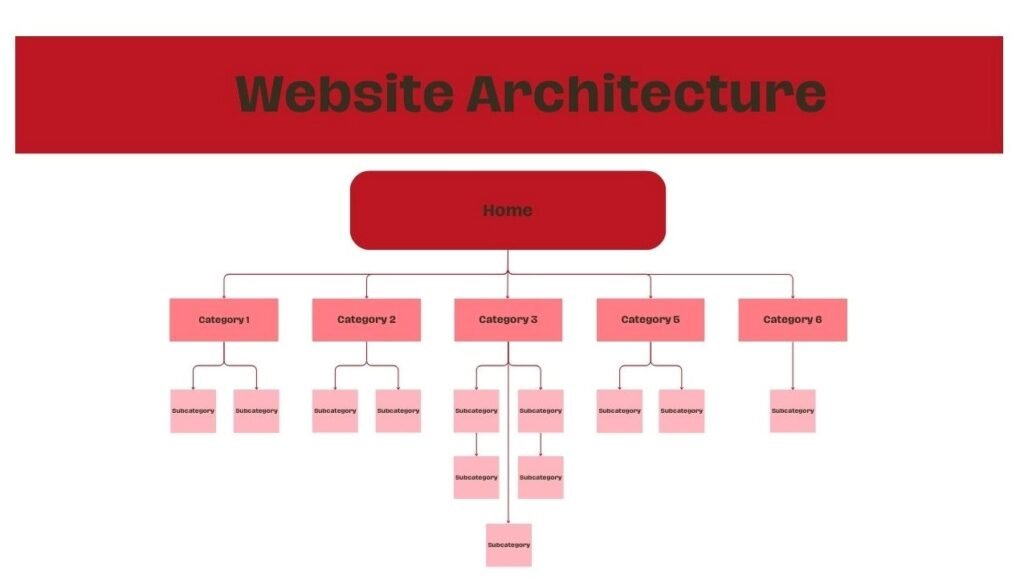
This method of segmentation and organization of content makes navigation easier and search engine crawling seamless, leading to simple and effective indexing of web pages.
This aspect of website development should be taken into account well in advance by web developers before building a website.
2 URL Redirection
When you delete pages, modify your site structure, or migrate your site to a new domain, broken links and 404 errors may arise, which never lead users to their final destination and obviously drive visitors away from your website.
In that case, it becomes important to carefully manage URL redirection for your website. Systematically managing your URL redirection helps you maintain your website’s link equity, also known as ranking power. It also helps you improve user experience, ultimately enabling you to retain and engage a maximum number of visitors on your website.
3 Enhancing Security with HTTPS
HTTPS – means hypertext transfer protocol secure encrypts the data exchanged between visitor’s browser and your website and keeps crucial information like customer login details, and financial & personal information safe. Securing website with HTTPS helps in boosting search engine rankings as it is one of the most significant ranking factor set by search engines.
Search engines would never rank a website that can compromise customers’ personal and financial information. Also, the HTTPS website can win visitors’ trust and engage and retain them.
So, if your website is HTTP, you need to switch it to HTTPS for higher rankings in search engines, which would eventually lead to increased traffic and conversions.
4 Multiple Platform Compatibility
Before even building a website, you need to decide on which platforms and devices would it be compatible with. These days you cannot limit your website to be viewed properly on a single operating system, platform or device. There are so many different mobile devices and operating systems available in the market, and you never know whether your target audience is trying to view your website using Android, iOS, or Windows.
In that case, you need to ensure that your website functions well on any device, including laptops, smartphones, iPads, etc., using multiple operating systems like Windows, iOS, Android, Linux, and more.
Ensuring multiple platform compatibility, in other words also known as building a responsive website will help you gain higher search engine rankings because Google prioritizes responsive websites for indexing and listing pages in front of users. Higher rankings leads to more visitors and more visitors ultimately means business growth and expansion.
5 Website Speed
This is one of the most significant aspects of SEO for Developers. Users prefer visiting websites that load quickly. With the attention span decreasing day by day, it is obvious that slow-loading websites can drive visitors away. As search engines prioritize user experience, your site speed can have a direct impact on your search engine rankings.
All you need to do is ensure that your website includes reduced image files, videos, GIFs, and other design elements. Also, make sure that your website code is free of unnecessary characters and white spaces, which can slow down your website.
Google’s Page Speed Insights can help you detect the elements slowing down your website. Look for specific pages to eliminate those elements from your website and avoid bounce rates and improve search engine rankings.
6 Apply Schema Markup
Schema Markup, also known as structured data, is code that helps you provide additional information like product prices, reviews, etc., in search engine listing pages. This helps search engines understand your business better, improving your chances of ranking on top. Below is an example of structured data:
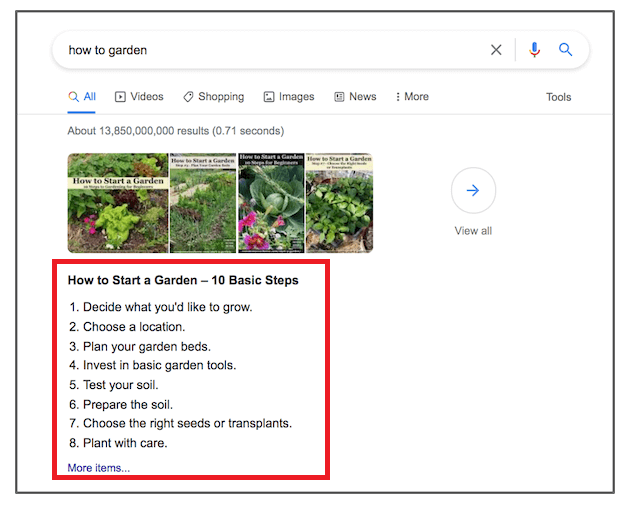
But how do you rank your website with snippets?
Web developers need to work with the marketing team to identify the content on your website that can be displayed as rich snippets in search engine results. Most common ones include products, prices, ratings, recipes, events, etc. After that, web developers can add the schema markup to the HTML code, and your website is ready to display structured data in search engine listings.
7 XML Sitemap
An XML sitemap lists all the important pages of your website. Uploading an XML sitemap offers many benefits, such as improved indexing, faster crawling, and better understanding of website structure. This is what an XML sitemap looks like:
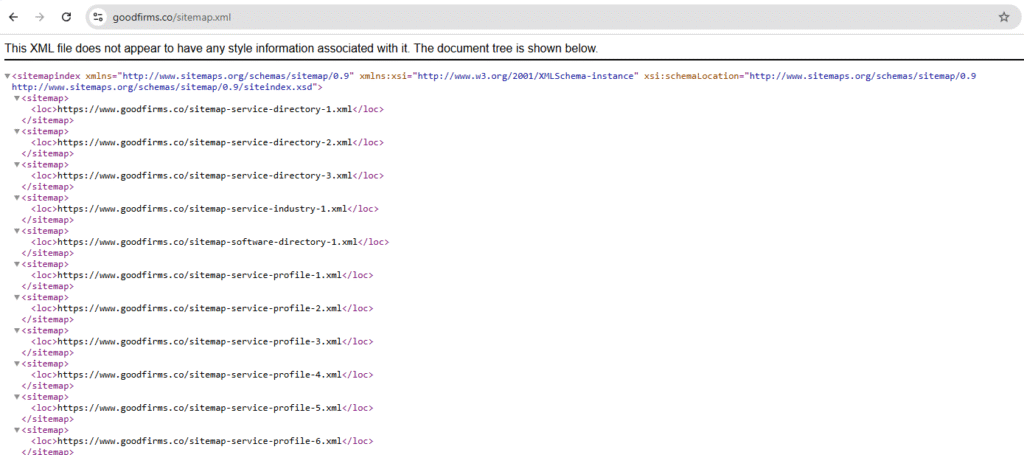
Web developers can collaborate with the SEO team to identify the most important pages that need to be included in your sitemap, and then generate it and upload on your web server. Many CMS like WordPress can generate an XML sitemap automatically, and in that case all you need to is retrieve it.
8 Canonical Tags
Canonical tags are used when there are multiple versions of a single page. It requires search engines to know which version of those similar pages is the primary one. Without canonical tags it becomes difficult for search engines to understand which pages should be focused on and which ones should be ignored and not indexed.
Canonical tags are added in the <head> section of webpages, and this is how it looks like:
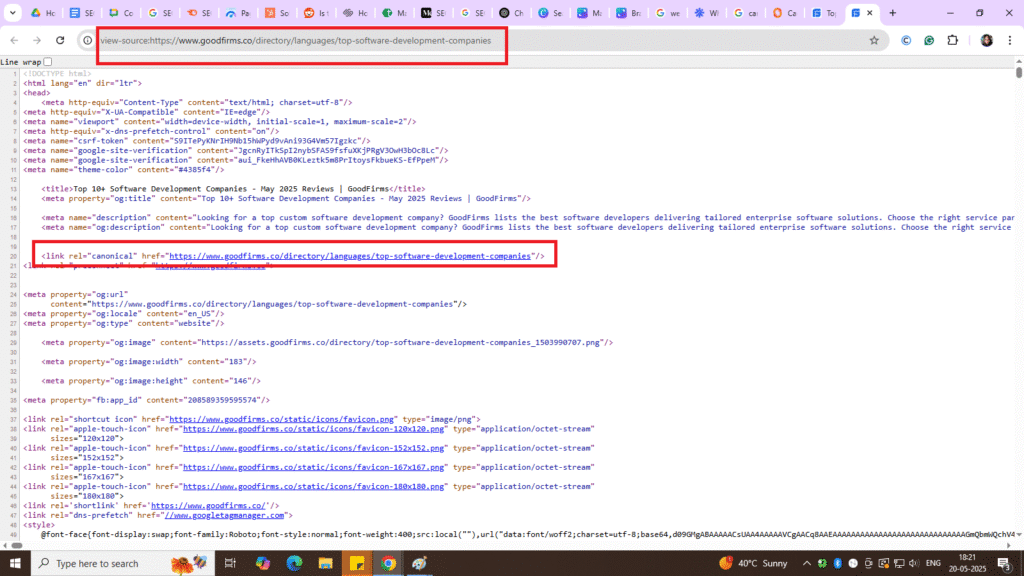
Web developers need to work with the SEO team to understand which web pages of your site need canonical tags and implement them to help search engine crawlers navigate through your website effectively.
9 Robots.txt
Configuring the Robots.txt file is important to help search engine crawlers know which pages of your website should not be crawled. It helps in hiding pages you don’t want to be indexed and ensures that the pages that are more important for taking your business forward are indexed and listed in search engines. This is how the robots.txt file looks:

The Robots.txt file is supposed to be uploaded to the root directory on a web server. It helps search engine crawlers understand which pages are important and which ones are not required to be crawled.
10 Semantic HTML
Semantic HTML is a technique that helps web developers improve website accessibility. This means that the website is now easily accessible to even users with disabilities. This helps in boosting user experience which leads to higher rankings and expanding your target audience.
There are several tools like Accessibility Scan & Monitor which can help you check your site’s accessibility to visual impairments and disability.
Final Words: Improving Search Engine Ranking for your Website
Hence, ensuring that all the above aspects are taken care of throughout your web development or maintenance process can help your business succeed in terms of search engine ranking, increased visitors, and ultimately improved revenue generation.
Get started with these tips on SEO for developers and optimize your website for search engines.
Contributors: @amikariya (GoodFirms), @gourav (MediaOfficers)




